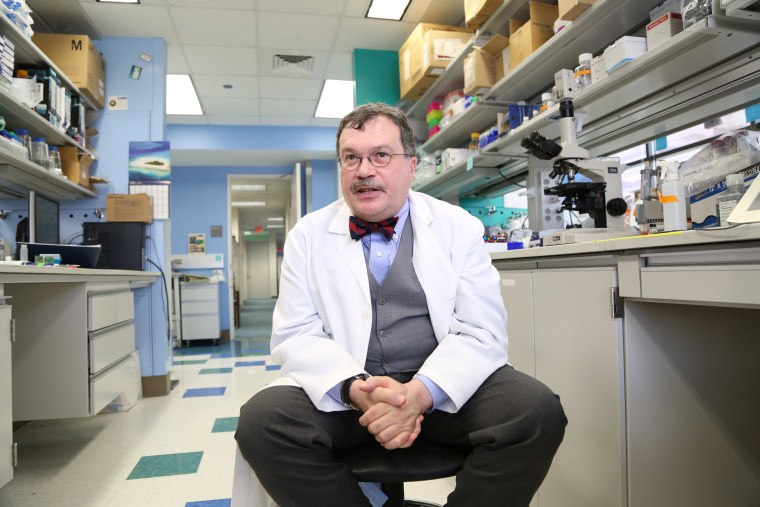Dr. Peter Hotez, co-director of the Texas Children’s Hospital’s Center for Vaccine Development in Houston, at his lab in 2012.Brett Coomer / Houston Chronicle via AP
Hotez took that message to Congress on Thursday while testifying before the House Committee on Science, Space, and Technology. He argued that the new coronavirus should trigger changes in the way the government funds vaccine development.
“It’s tragic that we won’t have a vaccine ready for this epidemic,” Hotez wrote in prepared remarks. “Practically speaking, we’ll be fighting these outbreaks with one hand tied behind our backs.”
As of Sunday, there had been well over 100,000 confirmed coronavirus cases globally and at least 3,700 deaths. Public health officials are concerned that the virus, which can lead to respiratory failure brought on by pneumonia, will spread widely in the U.S. and last beyond this year — much like the seasonal flu, but more severe and potentially deadlier.
In response, pharmaceutical companies, university researchers and the federal government have been rushing to develop a vaccine. In addition to the official government effort led by the National Institutes of Health, several drugmakers are also scrambling to develop a vaccine that can be tested in humans in the coming months. But even under the rosiest of projections, one won’t be ready for more than a year, government officials say.
“I’m cautiously optimistic that we will get a vaccine,” Dr. Anthony Fauci, the National Institutes of Health’s director for infectious diseases, said in an interview this week. “The thing that’s sobering is that it’s not a vaccine we’re going to have next month, so we’re going to have to tough it out through this evolution.”

For weeks, Hotez has been reaching out to pharmaceutical companies and federal scientific agencies — and even the Medical Research Council in the United Kingdom — asking them to provide the roughly $3 million needed to begin testing the vaccine’s safety in humans, but so far none have done so.
“We’ve had some conversations with big pharma companies in recent weeks about our vaccine, and literally one said, ‘Well, we’re holding back to see if this thing comes back year after year,'” Hotez said.
He said he hopes the seriousness of the outbreak leads to reforms in how the federal government funds vaccine development, although he notes that he called for similar changes after the SARS and Ebola outbreaks. He said he’s particularly worried about the toll the coronavirus will take on elderly nursing home residents and health care workers. But in his testimony to Congress on Thursday, Hotez also made an economic argument.
“Because nobody would invest a few million dollars into these SARS vaccines, we’re looking at, I don’t know what the number is, $10 billion, $100 billion in economic losses,” Hotez said ahead of his appearance in Washington. “The stakes are so high, and the amount of money you’re talking about to fund this research is so modest.”





Wasn’t Obummer the President in 2012? Maybe the libtard posters on the CCO can answer that.
Comments are closed.